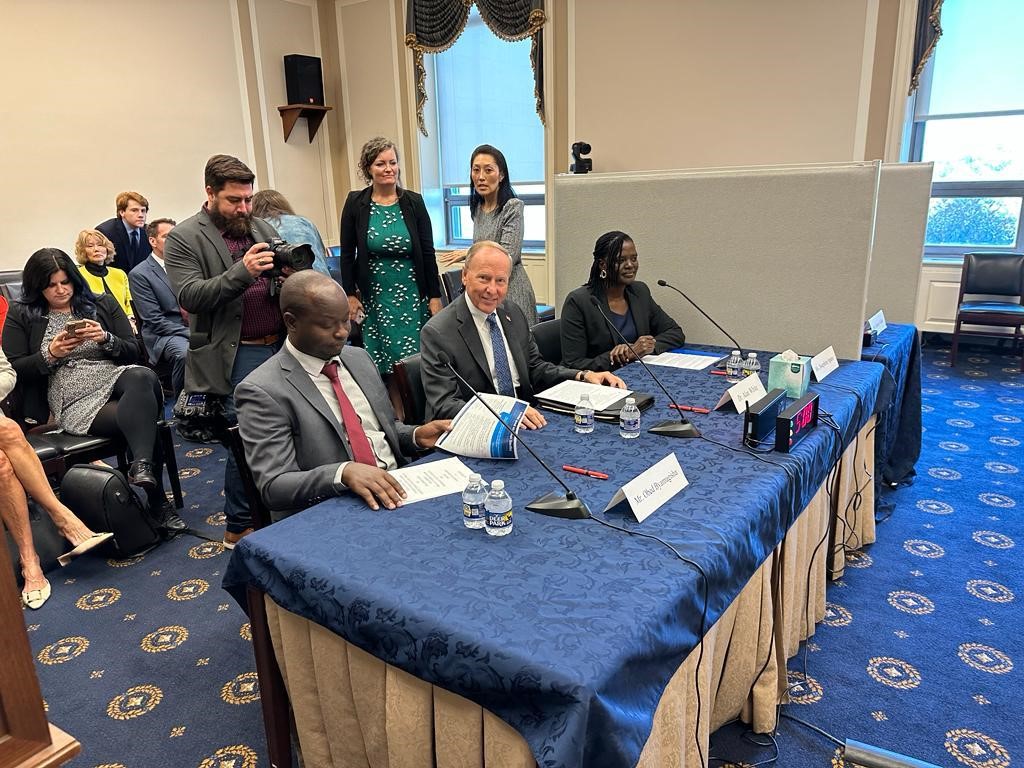Dr. Alan W. White, Co-Executive Director of the Advocacy Foundation for Human Rights, delivered a compelling testimony before the Committee on Foreign Affairs, Subcommittee on Global Health, Global Human Rights, and International Organizations, addressing the pressing issue of ritualistic killings in Africa, with a particular focus on Liberia. Dr. White shed light on the Foundation’s mission to combat human rights violations, including ritualistic killings and the alarming allegations linking these acts to high-ranking government officials, including the Executive Mansion.
The Advocacy Foundation for Human Rights, a non-profit organization based in Washington, D.C., has been dedicated to targeting human rights violators, exposing public corruption, and advocating for justice and accountability for the victims of such atrocities.
Others who testified before the Committee headed by Congressman Chris Smith Obed Byamugisha, Program Advisor, Kyampisi Childcare Ministries; Miriam Fullah, Trafficking in Persons Protection Manager, World Hope International; Josephine Aparo Founding Member, Global Survivor Network and International Justice Mission.
In his testimony, Dr. White detailed the challenges faced in gathering information and conducting investigations into ritualistic killings, emphasizing the danger faced by sources who dare to speak out against these crimes.
Dr. White’s credentials as Chief of Investigations for the Special Court for Sierra Leone, where he directed criminal investigations leading to numerous indictments and convictions, lent significant weight to his testimony. He notably highlighted the conviction of former Liberian President Charles Taylor, the first sitting Head of State to be indicted and convicted for war crimes, serving a 50-year prison sentence.
The Special Court for Sierra Leone was established to investigate and prosecute those responsible for the devastating civil war in Sierra Leone, spanning from 1991 to 2002, which resulted in the deaths of over 70,000 people. Dr. White’s investigations led him to neighboring Liberia, which also experienced two brutal civil wars, resulting in the deaths of over 250,000 Liberians.
During his tenure as Chief of Investigations, Dr. White bore witness to unspeakable human rights violations perpetrated through ritualistic activities, a phenomenon he had not encountered before. He recounted a chilling story from 2002, where a 70-year-old man seeking a political position in a local Village, believed in black magic and sacrificed a 9-year-old boy to gain power. This horrifying act shed light on the prevalence of ritualistic killings in West Africa, where individuals commission murders to obtain body parts for magic spells and gain political power.
The Foundation has received disturbing information about the frequency of such killings and the allegations linking it to the Executive Mansion (The Office of the President) and other high-ranking government officials. Details of these atrocities are difficult to obtain.
Dr. Alan W. White, Co-Executive Director of the Advocacy Foundation for Human Rights
Dr. White’s testimony revealed the widespread practice of ritualistic killings during Sierra Leone’s civil war, with various rebel groups and warring factions, such as the Revolutionary United Front (RUF), the Armed Forces Revolutionary Council (AFRC), and the Civil Defense Force (CDF), routinely engaging in such acts. He described how rebels would boast about consuming the organs of their victims, believing it granted them supernatural power.
Importantly, Dr. White highlighted that ritual killings persist in Sierra Leone today, often escalating during election periods when some politicians believe they can gain power through human sacrifices. These alarming practices have also been reported in Liberia, where ritualistic killings are a combination of traditional beliefs and the criminal behavior of unscrupulous politicians.
Liberia has a history of ritualistic killings during its civil wars, with figures like Milton Blahyi, also known as ‘General Butt Naked’, publicly admitting to eating children’s hearts and taking part in human sacrifices to ensure victory in battle.
Dr. White’s testimony also touched upon recent cases of ritualistic killings in Liberia, such as the mysterious disappearance of three young men hired for a task in Bong County in October 2020 by the St. Moses Funeral Home. The bodies of these young men were never returned to their families, and investigations into their deaths remain unresolved, raising suspicions of involvement by influential individuals with close government ties.
“The Foundation has received disturbing information about the frequency of such killings and the allegations linking it to the Executive Mansion (The Office of the President) and other high-ranking government officials. Details of these atrocities are difficult to obtain,” he said.
He also linked the past regime to acts of ritualistic killings, saying “The Ellen Johnson Sirleaf administration during her 12 years (2006-2018) in office was plagued with ritual killings and despite vows to bring them to an end they continued. The same problems continue under the Weah administration and unlike Sirleaf there were no insiders reporting her direct involvement with the ritual killings.”
Dr. White commended the Subcommittee for its work and called for a thorough examination of the issue of ritualistic killings in Africa, especially in Liberia. He urged legislation that could bring an end to these heinous crimes, emphasizing the importance of exposing those involved and prosecuting them for their actions. The Advocacy Foundation for Human Rights remains committed to addressing this dark issue plaguing many African countries and hopes that the Subcommittee’s efforts will help put an end to these atrocities once and for all.
Source: Front Page Africa






